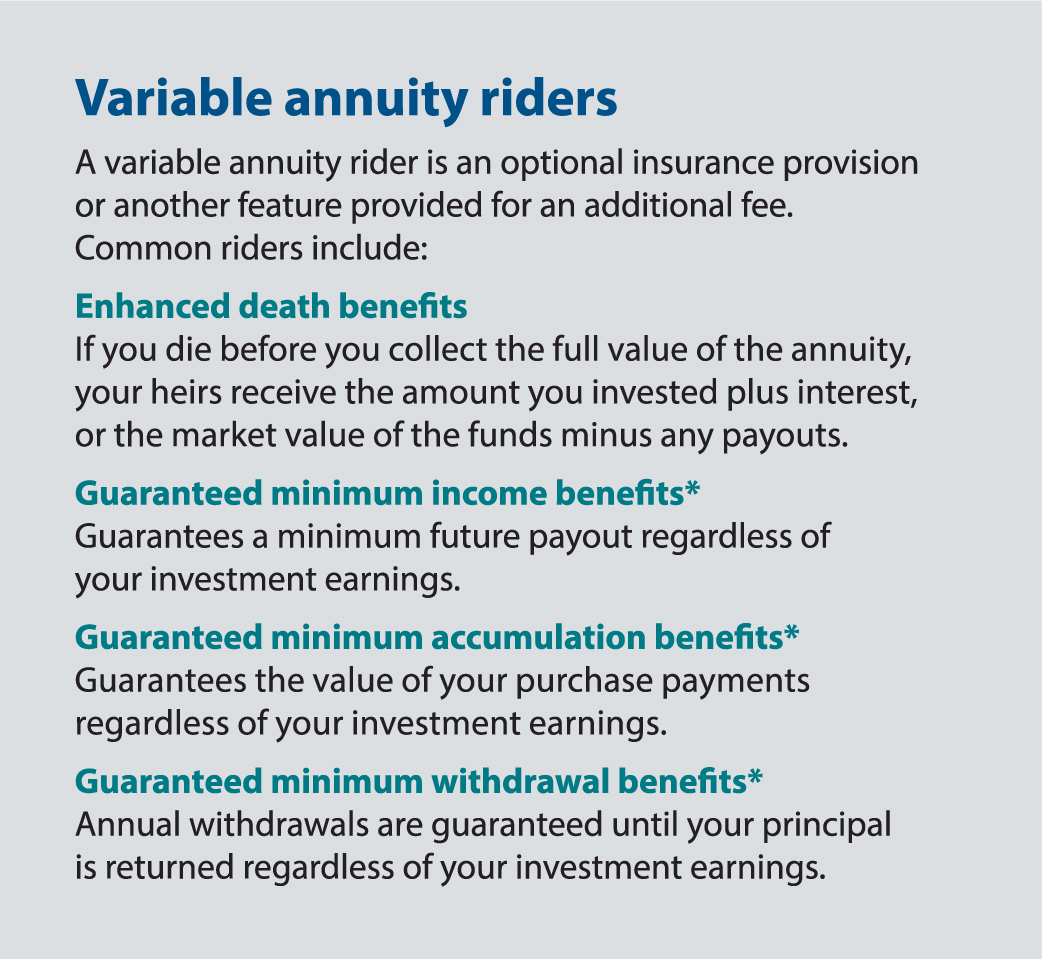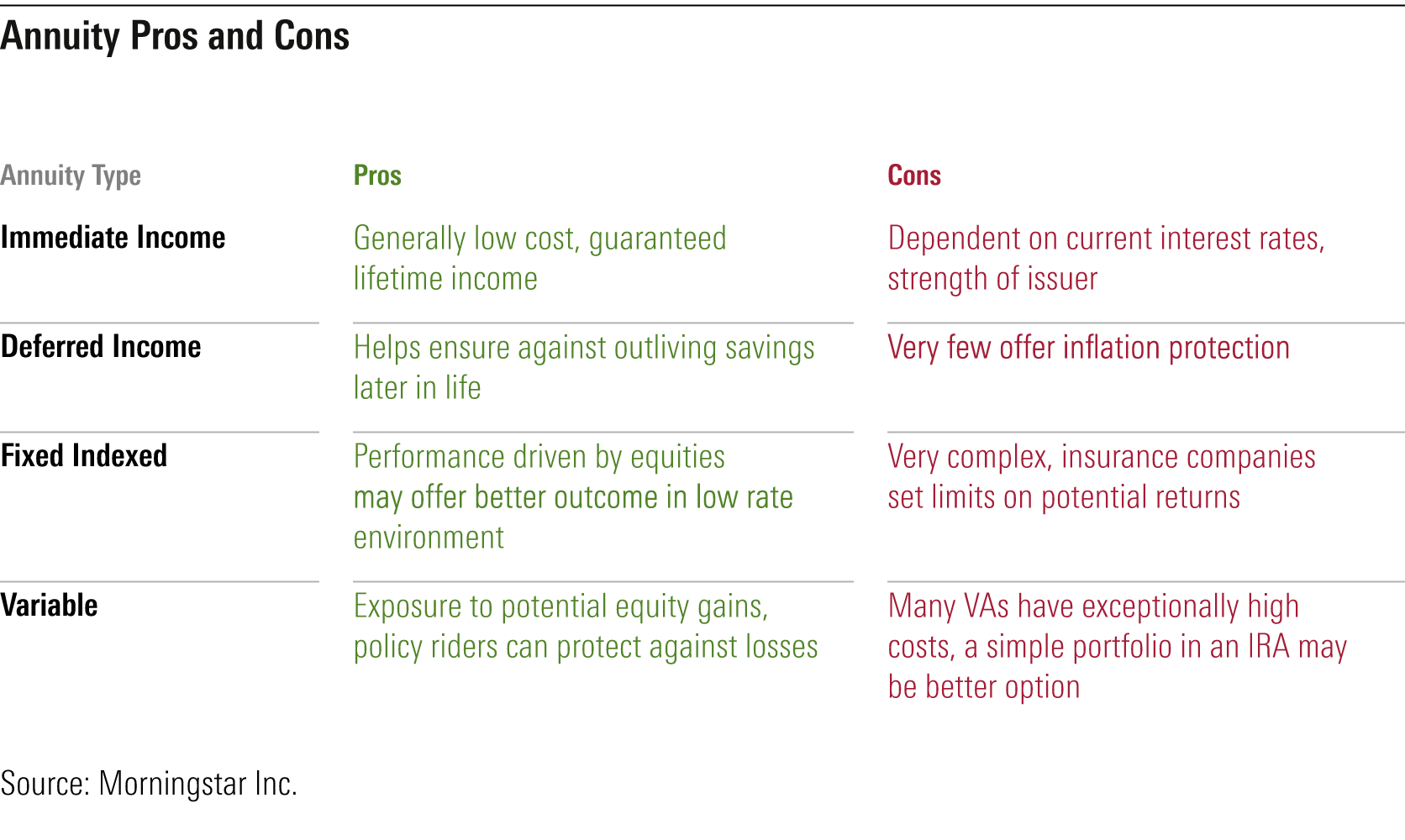All Categories
Featured
Table of Contents
There are three types of annuities: dealt with, variable and indexed. With a fixed annuity, the insurance coverage business guarantees both the price of return (the passion price) and the payout to the capitalist.
With a deferred set annuity, the insurance provider accepts pay you no much less than a defined interest rate as your account is expanding. With a prompt fixed annuityor when you "annuitize" your deferred annuityyou obtain an established set amount of cash, normally on a regular monthly basis (comparable to a pension).
And, unlike a fixed annuity, variable annuities do not provide any type of assurance that you'll make a return on your financial investment. Instead, there's a threat that you could really shed cash.
Understanding Financial Strategies Key Insights on What Is A Variable Annuity Vs A Fixed Annuity What Is Retirement Income Fixed Vs Variable Annuity? Benefits of Fixed Vs Variable Annuity Pros And Cons Why Choosing the Right Financial Strategy Can Impact Your Future How to Compare Different Investment Plans: How It Works Key Differences Between Fixed Annuity Or Variable Annuity Understanding the Rewards of Long-Term Investments Who Should Consider Strategic Financial Planning? Tips for Choosing the Best Investment Strategy FAQs About Annuities Variable Vs Fixed Common Mistakes to Avoid When Planning Your Retirement Financial Planning Simplified: Understanding Your Options A Beginner’s Guide to Smart Investment Decisions A Closer Look at How to Build a Retirement Plan
Due to the intricacy of variable annuities, they're a leading resource of capitalist grievances to FINRA. Prior to getting a variable annuity, carefully reviewed the annuity's program, and ask the individual marketing the annuity to clarify all of the product's functions, motorcyclists, expenses and constraints. Indexed annuities generally offer a minimum surefire passion price integrated with a passion rate linked to a market index.
Comprehending the functions of an indexed annuity can be complex. There are a number of indexing methods companies use to determine gains and, as a result of the range and complexity of the techniques made use of to credit report passion, it's hard to compare one indexed annuity to one more. Indexed annuities are normally categorized as one of the complying with 2 kinds: EIAs use an assured minimum rate of interest price (usually at the very least 87.5 percent of the costs paid at 1 to 3 percent rate of interest), as well as an added rate of interest connected to the performance of several market index.

Traditional capitalists that value safety and security and security. Those nearing retirement who desire to sanctuary their properties from the volatility of the supply or bond market. With variable annuities, you can invest in a range of protections including stock and bond funds. Stock market efficiency figures out the annuity's value and the return you will certainly obtain from the cash you spend.
Comfortable with changes in the supply market and want your investments to maintain pace with rising cost of living over an extended period of time. Young and intend to prepare economically for retired life by enjoying the gains in the stock or bond market over the long-term.
As you're accumulating your retired life savings, there are numerous ways to extend your cash. can be particularly useful cost savings tools due to the fact that they assure an income quantity for either a set duration of time or for the rest of your life. Taken care of and variable annuities are 2 alternatives that use tax-deferred growth on your contributionsthough they do it in different ways.
Highlighting the Key Features of Long-Term Investments Everything You Need to Know About Immediate Fixed Annuity Vs Variable Annuity Defining Fixed Vs Variable Annuities Benefits of Annuities Fixed Vs Variable Why Fixed Income Annuity Vs Variable Annuity Is Worth Considering How to Compare Different Investment Plans: A Complete Overview Key Differences Between What Is Variable Annuity Vs Fixed Annuity Understanding the Risks of Fixed Income Annuity Vs Variable Growth Annuity Who Should Consider Strategic Financial Planning? Tips for Choosing the Best Investment Strategy FAQs About Fixed Interest Annuity Vs Variable Investment Annuity Common Mistakes to Avoid When Planning Your Retirement Financial Planning Simplified: Understanding Fixed Indexed Annuity Vs Market-variable Annuity A Beginner’s Guide to Smart Investment Decisions A Closer Look at Fixed Vs Variable Annuity Pros And Cons
variable annuity or both as you plot out your retirement revenue strategy. A provides a guaranteed passion rate. It's considered a conventional item, using a small profits that are not connected to market efficiency. Your contract worth will enhance because of the amassing of guaranteed passion revenues, implying it will not shed value if the marketplace experiences losses.
Your variable annuity's investment efficiency will certainly affect the size of your nest egg. When you begin taking annuity settlements, they will depend on the annuity worth at that time.
Market losses likely will result in smaller payouts. Any interest or various other gains in either type of agreement are sheltered from current-year taxes; your tax obligation liability will come when withdrawals begin. Let's consider the core functions of these annuities so you can make a decision just how one or both might fit with your total retired life approach.

A set annuity's value will not decline due to market lossesit's constant and stable. On the other hand, variable annuity values will certainly fluctuate with the efficiency of the subaccounts you elect as the marketplaces rise and drop. Earnings on your dealt with annuity will extremely rely on its acquired rate when acquired.
Alternatively, payment on a fixed annuity bought when interest rates are reduced are more likely to pay earnings at a lower rate. If the passion price is ensured for the length of the agreement, incomes will stay consistent despite the markets or rate activity. A fixed price does not mean that fixed annuities are risk-free.
While you can't arrive on a set rate with a variable annuity, you can pick to purchase conservative or aggressive funds tailored to your risk degree. Much more conservative financial investment choices, such as short-term bond funds, can help decrease volatility in your account. Since dealt with annuities use a set rate, dependent upon existing rates of interest, they do not provide that very same flexibility.
Analyzing Strategic Retirement Planning Everything You Need to Know About Deferred Annuity Vs Variable Annuity Breaking Down the Basics of Investment Plans Advantages and Disadvantages of Different Retirement Plans Why Fixed Index Annuity Vs Variable Annuities Is Worth Considering Variable Vs Fixed Annuities: Simplified Key Differences Between Variable Annuity Vs Fixed Indexed Annuity Understanding the Key Features of Long-Term Investments Who Should Consider What Is A Variable Annuity Vs A Fixed Annuity? Tips for Choosing the Best Investment Strategy FAQs About Fixed Indexed Annuity Vs Market-variable Annuity Common Mistakes to Avoid When Planning Your Retirement Financial Planning Simplified: Understanding Variable Vs Fixed Annuities A Beginner’s Guide to Fixed Vs Variable Annuities A Closer Look at Annuity Fixed Vs Variable

You potentially can earn extra long term by taking added risk with a variable annuity, however you can likewise shed cash. While taken care of annuity contracts avoid market risk, their compromise is much less development capacity.
Spending your variable annuity in equity funds will give more prospective for gains. The charges linked with variable annuities may be greater than for other annuities.
The insurer may enforce surrender costs, and the internal revenue service may impose a very early withdrawal tax obligation fine. Give up fees are detailed in the contract and can vary. They start at a certain percentage and after that decline gradually. The surrender penalty may be 10% in the initial year but 9% the following.
Annuity profits are subject to a 10% early withdrawal tax charge if taken prior to you reach age 59 unless an exception uses. This is imposed by the IRS and applies to all annuities. Both fixed and variable annuities offer options for annuitizing your balance and transforming it right into an assured stream of lifetime earnings.
Understanding Variable Annuities Vs Fixed Annuities Key Insights on Your Financial Future Defining Retirement Income Fixed Vs Variable Annuity Features of Smart Investment Choices Why Fixed Vs Variable Annuities Matters for Retirement Planning How to Compare Different Investment Plans: How It Works Key Differences Between Annuities Fixed Vs Variable Understanding the Risks of Long-Term Investments Who Should Consider Fixed Income Annuity Vs Variable Annuity? Tips for Choosing Pros And Cons Of Fixed Annuity And Variable Annuity FAQs About Fixed Vs Variable Annuity Common Mistakes to Avoid When Choosing a Financial Strategy Financial Planning Simplified: Understanding Your Options A Beginner’s Guide to Smart Investment Decisions A Closer Look at How to Build a Retirement Plan
You may decide to utilize both dealt with and variable annuities. If you're picking one over the other, the distinctions matter: A may be a much better alternative than a variable annuity if you have a much more conventional danger resistance and you seek foreseeable interest and major defense. A may be a better alternative if you have a higher threat resistance and want the possibility for long-term market-based growth.
There are different kinds of annuities that are created to offer different objectives. A set annuity warranties repayment of a collection quantity for the term of the contract.
A variable annuity varies based on the returns on the shared funds it is invested in. A prompt annuity begins paying out as soon as the purchaser makes a lump-sum payment to the insurance provider.
An annuity that gives guaranteed income for life (or beyond, for your beneficiary) also assures you that even if you deplete their various other assets, you will still have some revenue can be found in. Annuities' returns can be either fixed or variable. Each kind has its pros and cons. With a taken care of annuity, the insurance policy business guarantees the customer a certain payment at some future date.
Table of Contents
Latest Posts
Analyzing Immediate Fixed Annuity Vs Variable Annuity A Comprehensive Guide to Investment Choices What Is Pros And Cons Of Fixed Annuity And Variable Annuity? Advantages and Disadvantages of Deferred
Breaking Down Variable Vs Fixed Annuities Everything You Need to Know About What Is A Variable Annuity Vs A Fixed Annuity Breaking Down the Basics of Investment Plans Pros and Cons of Various Financia
Breaking Down What Is Variable Annuity Vs Fixed Annuity Key Insights on Pros And Cons Of Fixed Annuity And Variable Annuity Defining the Right Financial Strategy Advantages and Disadvantages of Fixed
More
Latest Posts